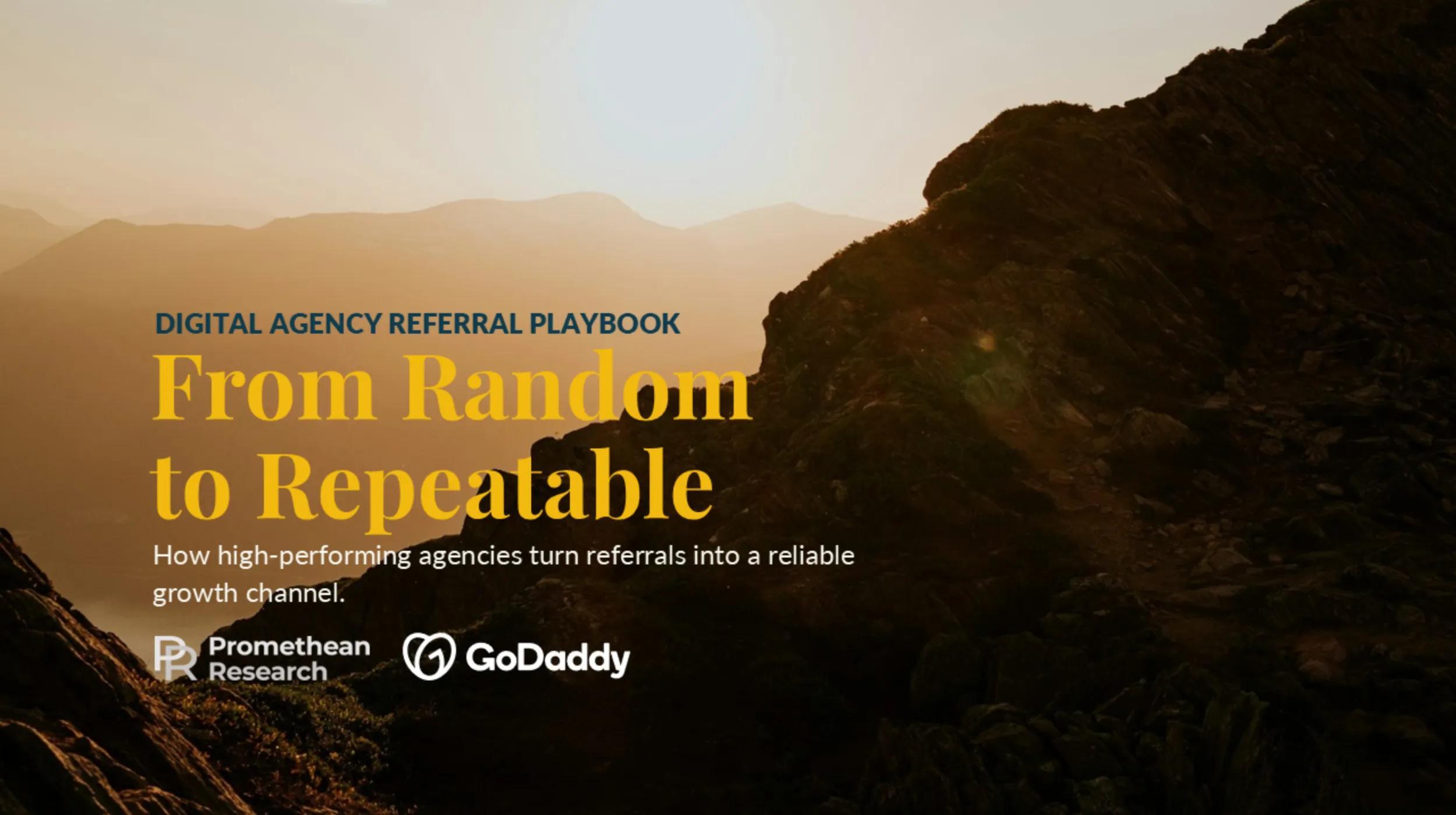GoDaddy has partnered with Promethean Research to learn more about how modern Digital Agencies operate and grow. Nicholas Petroski, co-founder of Promethean Research, contributed significantly to the research and creation of this blog post and the linked playbook.
Referrals are the key driver of agency growth. Unfortunately, it’s rare to come across an agency that has systematized referrals into a predictable channel. When demand is high, referrals seem to flow in almost magically. When demand wanes, they dry up, and agency teams are left to quickly backfill the sales pipeline.
This is often done via semi-heroic efforts from leadership, tapping their personal networks and driving sales through lean times.
It creates a boom-bust rollercoaster of sales that makes growing an agency that much harder. If this sounds familiar, you’re not alone, but it doesn’t have to be this way.
This Revgen Playbook shows that referrals, when properly structured, can become your most reliable and profitable growth lever. And by systematizing referrals, your agency can successfully shift from reactive to proactive, creating predictable growth and profitability.
The referral paradox
First, let’s discuss why referrals are so tough to balance. There are multiple reasons why this channel seems to be neglected, but here are three of the most impactful:
1. Accountability
Most agencies leave referrals to chance because they lack clear accountability. Founders occasionally remember to ask clients for referrals, but this happens inconsistently, usually as an afterthought. Account managers, unsure of their role in the referral process, often hesitate, while sales teams are (rightfully) preoccupied chasing down opportunities and guiding them through the sales process.
As a result, referral opportunities slip through unnoticed, significantly hindering growth.
2. Intentionality
Many agencies inadvertently adopt a passive mindset, expecting clients to refer new business spontaneously. This works well when demand is high, but referrals dry up almost instantly the second economic uncertainty creeps in. Repeatable referrals require an active mindset from the whole team.
When teams operate with purpose, they consistently reach out, intentionally manage relationships, and engage in timely interactions; as a result, referrals come in more predictably.
3. Promptness
Finally, inconsistent follow-up undermines referral opportunities. Referrals inherently come with a sense of urgency. Failing to engage these warm leads promptly damages both prospect relationships and referral relationships. Conversely, when teams prioritize referred leads, it builds both prospect and referrer relationships.
The advantage of systematized referrals
The Revgen Playbook reveals striking benefits when agencies systematize referrals:
1. Predictable revenue
The first, most impactful, and most obvious is the creation of a predictable revenue stream. Instead of sporadic referrals, agencies can generate a consistent stream of quality leads that smooths out the boom-bust cycle that many shops find themselves trapped in.
2. Shorter sales cycles
Referrals significantly shorten sales cycles because referred prospects come with inherent trust and credibility. Unlike cold leads, referrals don't require extensive nurturing and convincing, allowing agencies to move swiftly from initial introduction to deal closure. This efficiency frees up sales resources to focus on closing even more opportunities.
3. Better client matches
Referred leads tend to align more closely with your agency’s ideal client profile, resulting in better-fit deals and stronger long-term client relationships. Because referrals typically come from existing satisfied clients or trusted partners who deeply understand your strengths, they naturally connect you to prospects that genuinely fit your services and capabilities.
4. Lower customer acquisition costs
Referrals substantially reduce customer acquisition costs. Instead of spending heavily on outbound marketing or paid advertising, agencies that activate warm referral channels benefit from significantly lower overheads and higher profitability. The Revgen Playbook highlights how this shift optimizes budgets and enhances overall growth.
Strategies for every agency size

Whether you run a boutique firm or a larger, more complex organization, your referral strategy and tactics should fit your resources. Here’s an overview of how systematized referral processes work at shops of varying sizes.
- Small agencies (Under 10 employees): Founders manage referrals directly, integrating asks naturally into client interactions. Like everything at this size, it’s a founder-led game.
- Mid-size agencies (10–25 employees): Distribute referral responsibilities to account managers, with sales or senior staff re-engaging past clients or strategic partners.
- Larger agencies (25+ employees): Fully integrate referrals across account management, business development, and marketing to ensure consistent outreach and follow-up at scale.
Create effective referral incentives
There are practical ways to incentivize referrals, but they must be designed to balance immediate rewards with maintaining healthy, long-term relationships.
For instance, cash bonuses are a direct and compelling incentive that often delivers immediate results, causing significant short-term increases in referral volume. These straightforward financial rewards can be powerful motivators, but agencies must carefully manage them to ensure they don't compromise profitability or overload the team with too much work.
Recognition is another powerful yet cost-effective incentive. Public acknowledgment or personalized appreciation can foster deeper relationships and build loyalty over time, motivating clients and partners to repeatedly refer business.
Discounts and charitable donations can work in certain circumstances but tend to be less desirable from an agency perspective. They need to be used as strategic alternatives tailored to align with specific client motivations.
Offering discounts on future services can encourage continued engagement from existing clients, reinforcing relationships without significantly impacting margins. Charitable donations, meanwhile, appeal to clients’ altruistic values and enhance the agency's social responsibility image, providing a meaningful and motivational reward for referrals.
Use clear, concise, and repeatable messaging
Two components can dramatically enhance the effectiveness of your referrals: the Ideal Referrer Profile (IRP) and the Core Referral Statement. We go into greater detail in the playbook, but here’s a quick synopsis.
An Ideal Referrer Profile identifies exactly who is best positioned to introduce your agency to its ideal clients. Knowing precisely whom to approach for referrals allows you to cultivate relationships that produce leads that consistently fit your ideal client profile.
A compelling Core Referral Statement clearly defines who your agency serves, the problems you solve, and the types of clients you seek. Agencies can significantly reduce referral friction by using a concise, memorable referral statement. At its core, it enables referrers to make introductions confidently.
Agencies leveraging these two tools report faster sales cycles and substantially improved lead alignment.
Boost your referrals to unlock reliable agency growth
The Revgen Playbook guides you step-by-step through building a robust, predictable referral engine. Immediate implementation can shift your agency from passive referrals to strategic, repeatable revenue growth.
Ready to turn relationships into consistent revenue streams?
Download the Revgen Playbook Now and start unlocking your agency's full referral potential.
Learn how GoDaddy can help you increase your high-quality referrals.






